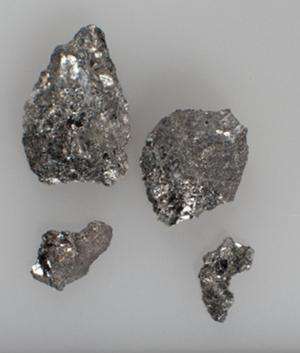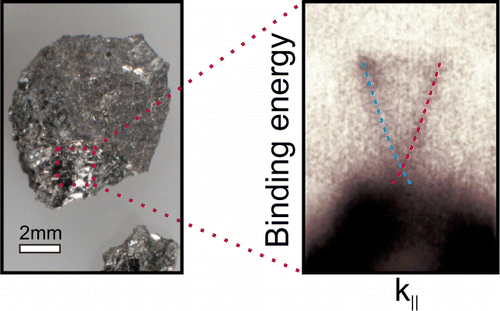First discovery of a natural topological insulator

(Phys.org) —In a step toward understanding and exploiting an exotic form of matter that has been sparking excitement for potential applications in a new genre of supercomputers, scientists are reporting the first identification of a naturally occurring "topological insulator" (TI). Their report on discovery of the material, retrieved from an abandoned gold mine in the Czech Republic, appears in the ACS journal Nano Letters.
Pascal Gehring and colleagues point out that synthetic TIs, discovered only a decade ago, are regarded as a new horizon in materials science. Unlike conventional electrical insulators, which do not conduct electricity, TIs have the unique property of conducting electricity on their surface, while acting as an insulator inside. Although seemingly simple, this type of surface could allow manipulation of the spin of an electron, paving the way for development of a quantum computer. Such a computer would crunch data much faster than today's best supercomputers.
The research team describes discovering that the mineral Kawazulite, found in the Czech gold mine and processed into nanoflakes, is a natural TI. The flakes were so small that thousands would fit inside the dot over an "i." Based on the discovery, natural TIs may exist in other minerals, the report states. Scientists, they recall, once believed that quasi-crystals—topic of the 2011 Nobel Prize in Chemistry—were available only synthetically, but those materials recently were discovered in sky-fallen meteorites.

The article is titled "A Natural Topological Insulator."
More information: A Natural Topological Insulator, Nano Lett., Article ASAP. DOI: 10.1021/nl304583m
Abstract
The earth's crust and outer space are rich sources of technologically relevant materials which have found application in a wide range of fields. Well-established examples are diamond, one of the hardest known materials, or graphite as a suitable precursor of graphene. The ongoing drive to discover novel materials useful for (opto)electronic applications has recently drawn strong attention to topological insulators. Here, we report that Kawazulite, a mineral with the approximate composition Bi2(Te,Se)2(Se,S), represents a naturally occurring topological insulator whose electronic properties compete well with those of its synthetic counterparts. Kawazulite flakes with a thickness of a few tens of nanometers were prepared by mechanical exfoliation. They exhibit a low intrinsic bulk doping level and correspondingly a sizable mobility of surface state carriers of more than 1000 cm2/(V s) at low temperature. Based on these findings, further minerals which due to their minimized defect densities display even better electronic characteristics may be identified in the future.
Journal information: Nano Letters
Provided by American Chemical Society




















